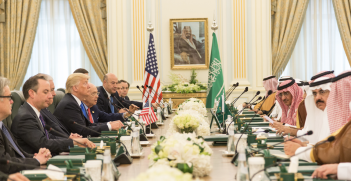What are the Ethical Limits of National Security?

Are there moral limits to state responses to violent extremism? And, if so, how do we find these limits?
While it may seem self-evident that there are, and ought to be, limits to counter terrorism policies, there is an increasingly widespread public opinion that political leaders can, and must, do everything they can to protect against terrorist acts. Liberal-democratic societies are facing the threat of domestic terrorism, and for a political leader to say that ‘we cannot stop all terrorist acts and, indeed, neither should we’ would sound the death knell for their career.
Domestic terrorism is a primary focus of much national security policy, and often counter terrorism policy forms the policy’s public face. Thus, counterterrorism policy is presented as both paradigmatic of national security policy justifications and a touchstone for its limiting conditions. By their own light, if the justifications offered for counterterrorism policy are accepted by national security practitioners, policymakers, politicians and the public, then it follows that those stakeholders ought to accept such limits.
The need for clear understanding of the moral limits of state responses to terrorism is reinforced by the post-September 11 break with previous forms of political violence. While many disagree with the spirit and content of particular counter terrorism policies, an approach is needed to find a common ground, an overlapping consensus where the point of agreement stems from a recognition of counter terrorism policy’s justificatory apparatus.
Central to the debate around the boundaries of a state’s response to terrorism is tension between the notion of a liberal-democratic government’s active support of its citizens freedom of choice and the state’s overriding purpose to provide security for its citizens. One side of the debate holds that the state’s primary duty is the provision of security to its people. The other is sceptical of the state’s designs for exceptionalist powers that result in a failure to defend against suspension or erosion of the fundamental rights of a liberal democracy.
It is not simply because of differing views on the importance of particular civil liberties that we need to set limits. Even if those responsible for counter terrorism policies are able to suppress the threat of terrorism, they cannot guarantee total security. There is no way to predict and protect against every single plausible security threat. A government would have to lock up everybody.
What makes terrorism so special?
Terrorism is frequently considered to be a special phenomenon, one that is not just of social importance, but is also conceptually challenging. Should there be any doubt about the special status of terrorism, consider the different treatment that deaths by terrorism are accorded when compared to other deaths. In the UK, for instance, in the period between 2000 and 2013, there were 38,316 fatalities resulting from road accidents, an average of 2737 per year. In the period between 1970 and 2007 in the UK, there were 2196 people killed by deliberate acts of terrorism, an average of 59 deaths per year and less than one-40th of the number of people killed on the roads. Highlighting that society does treat deaths from terrorism in a way that is vastly different to other deaths.
The differential response to terrorism is important. Terrorism is not simply understood differently to other social other social phenomena, but a zero-tolerance policy to terrorism is applied.
Justifying counter terrorism policy
In the first case, counter terrorism policy is justified by reference to the need to protect and secure some intangible good. The UK’s 2015 National Security Strategy and Strategic Defence and Security Review gives specific examples of values endorsed by the British government such as democracy, the rule of law, open, accountable government, human rights, freedom of speech and the empowerment of women and girls.
The second specifying condition sees the spread of fear through a population as a defining feature of terrorism, and its prevention is core to counter terrorism policy. Counterterrorism policies are justified by reference to population-level fear.
Finally, the third specifying condition is the cost of terrorism. The economic costs of terrorism are used to justify counter terrorism policies, making an explicit connection between economic security and national security.
Recognising limits
Specifying the conditions used to justify counter terrorism policies also allows for limits to be identified and resolved. Due to the pluralistic nature of liberal-democratic societies, there are multiple values and multiple ways of understanding and weighting these values. The way to resolve this problem is to see how the justifications for counter terrorism policy play a role in limiting the same counter terrorism policy. This solution builds from a simple premise of justificatory consistency. If a specific reason is held to justify a given action, by its own lights the given action must be consistent with that justificatory reason.
Taking it as a given that the need to protect the intangible good justifies counter terrorism policies, consistency requires that this justificatory apparatus also limits counter terrorism policy. If the protection of intangible goods is important enough to permit emergency measures beyond rules that would otherwise bind, intangible goods are important enough to limit such policies The point is that if the foundation of an argument for pursuit of national security is protecting an intangible value like the rule of law, consistency demands that the rule of law must be able to limit that policy or instance.
When considering the second specifying condition—that terrorism warrants special attention because of its capacity to spread population-level fear—the argument from the point of view of consistency holds that counter terrorism policy ought to be limited in spreading fear. That is, counter terrorism policies that spread fear and insecurity, exploiting a sense of vulnerability at the population level, are in the same bad category as terrorism.
Finally, we come to the specifying condition of economic impact. Again, consistency imposes a limiting condition: if counter terrorism policy is required because of the special economic stresses posed by terrorism, then economic considerations ought also to play a role in limiting counter terrorism policies.
The issue of finding the bounds of counter terrorism policy is a core challenge for liberal democracies. Citizens want security without losing the individual rights that make our societies what they are. However, the evolution of modern terrorism puts pressure on states, in part trying to force governments to be heavy-handed and thus providing a crude justification for the terrorists’ own ideological causes.
In order to find a way to recognise limits to national security, it is important to identify the specifying conditions of terrorism, those things that mark acts of terrorism out as something particularly special, warranting exceptional treatment through counter terrorism policy. Three have been identified: the threat to intangible goods that are part of our social fabric, the desire to spread population-level fear, and the extended economic impacts. These conditions define terrorism and thus justify of counter terrorism policy, while also imposing its limits.
Dr Adam Henschke is a lecturer in national security at the National Security College, Australian National University (ANU).
Dr Tim Legrand is a lecturer at the National Security College, Australian National University (ANU).
This article is an edited extract from an article published in the Australian Journal of International Affairs on 27 July 2017. It may be accessed in its unabridged form here.





